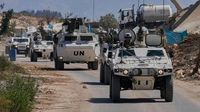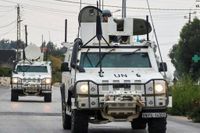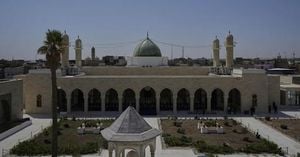After nearly five decades of monitoring a volatile border, the United Nations Security Council voted unanimously on Thursday, August 28, 2025, to terminate its peacekeeping force in southern Lebanon, known as UNIFIL, at the end of next year. This landmark decision, which comes after years of debate and shifting international priorities, will see the multinational force wind down its operations and withdraw its 10,800 military and civilian personnel by December 31, 2026. For a region long shaped by the blue-helmeted presence, the move signals a new and uncertain chapter.
UNIFIL, or the United Nations Interim Force in Lebanon, was first established in 1978 in the aftermath of Israel’s invasion of southern Lebanon. Its original mandate was to oversee the withdrawal of Israeli troops and restore peace along the UN-drawn Blue Line separating Lebanon and Israel. Over time, especially after the monthlong 2006 war between Israel and Hezbollah, the force’s mission expanded to include monitoring hostilities, supporting the deployment of the Lebanese armed forces in the south, and facilitating humanitarian access.
The latest Security Council resolution grants UNIFIL a final 16-month mandate—after which the force has one year, starting December 31, 2026, to complete its withdrawal. During this period, UNIFIL is authorized to carry out only a limited set of activities: providing security and assistance to UN personnel, maintaining situational awareness near its locations, contributing to the protection of civilians, and ensuring the safe delivery of humanitarian aid within its capacity. The aim, according to the resolution, is to make the Lebanese government “the sole provider of security” in southern Lebanon north of the Blue Line, and it calls on Israel to withdraw its forces from any areas north of that boundary.
The United States, which initially pushed for the force to be ended in just six months, later advocated for a one-year final extension before ultimately supporting the 16-month compromise. According to the Associated Press, this shift reflects both pressure from Israel—Washington’s close ally—and a desire to give Lebanon time to prepare for the transition. Acting U.S. ambassador Dorothy Shea said, “The security environment in Lebanon is radically different than just one year ago, creating the space for Lebanon to assume greater responsibility.” She added that the U.S. would continue working with Lebanon “to expand its capabilities as Lebanon carries out its critical work in disarming Hezbollah.”
The Trump administration’s stance on UNIFIL has been clear and forceful. Political appointees who entered office with a mandate to scale back U.S. commitments abroad have long regarded the operation as a waste of money. They argue that UNIFIL is merely delaying the goal of eliminating Hezbollah’s influence in the south and restoring full security control to the Lebanese armed forces. As a result, the U.S. has implemented major cuts in funding for the mission, drawing both domestic and international criticism.
Not everyone on the international stage agrees with the U.S. push for a rapid wind-down. European nations—most notably France and Italy, which have contributed significant troops and leadership to UNIFIL—have repeatedly warned that ending the peacekeeping mission before the Lebanese army is fully capable of securing the border area could create a dangerous vacuum. France’s deputy U.N. ambassador, Jay Dharmadhikari, stressed that UNIFIL’s ongoing operations are still vital, saying the extension of the mandate “will give the force precious time … to work alongside the mounting capabilities of the Lebanese army so that sovereignty can be extended throughout Lebanese territory.” He warned that “any premature withdrawal could undermine or even weaken” efforts to stabilize the region.
Lebanon’s own leaders have voiced deep concerns about the drawdown. Following last fall’s renewed conflict between Israel and Hezbollah, Lebanese officials made clear that their cash-strapped and overstretched army is not yet able to patrol the full area on its own. Prime Minister Nawaf Salam welcomed the decision to extend UNIFIL’s mandate through 2026, thanking “all friendly countries in this Council that expressed their understanding of Lebanon’s concerns.” The resolution, he believes, at least buys time for the Lebanese armed forces to build up the strength and resources needed to take over security responsibilities.
On the other side of the border, Israel’s position has been more complicated. Israel’s U.N. ambassador, Danny Danon, described the current moment as “decisive for Lebanon, Israel and the region, on what comes next.” However, Danon made no mention of Israel withdrawing its own forces from north of the Blue Line, as called for in the resolution. Instead, he accused UNIFIL of “consistently overlooking Hezbollah’s vast military buildup,” arguing that the force has provided the militant group “with cover to entrench itself.” Danon insisted that “strengthening the Lebanese armed forces is essential if Lebanon is ever to reclaim full sovereignty from Hezbollah.” He also signaled that Israel is prepared to advance talks with Lebanon on enforcing the border, should Lebanon move toward disarming Hezbollah.
Arab and regional voices have echoed concerns about the risks of a swift UNIFIL exit. Algeria’s U.N. Ambassador Amar Bendjama, representing Arab interests on the Security Council, said UNIFIL “remains indispensable to stability in Lebanon and in the region” by playing a key role in de-escalating tensions, supporting a ceasefire, and enabling Lebanese forces to deploy in the south. Bendjama warned that “without ending Israel’s occupation of Arab lands, peace and stability in the region will remain elusive.”
The Security Council’s resolution urges the international community “to intensify its support, including equipment, material and finance” to the Lebanese armed forces during this critical transition. The hope is that, with sufficient international backing, Lebanon can avoid the kind of security vacuum that might embolden Hezbollah or other militant groups to expand their influence.
Still, some observers worry that the withdrawal of UN peacekeepers could destabilize a region already on edge. The memory of last fall’s Israel-Hezbollah war is fresh, and the Lebanese army’s ability to fill the gap left by UNIFIL remains untested. As peacekeepers prepare to lower the blue flag for the last time, all eyes are on the Lebanese government and its international partners to see whether they can navigate the coming year without a return to violence.
For now, the clock is ticking. UNIFIL’s final mission is underway, and the world is watching to see if Lebanon can stand on its own—or if old rivalries will once again spill over the border.





